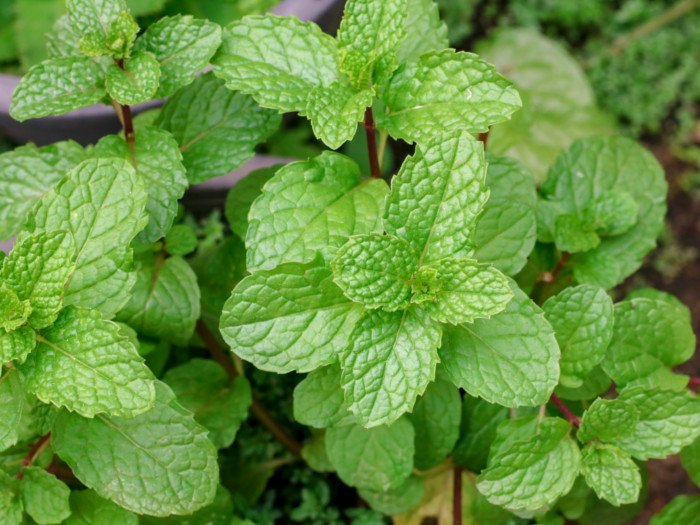Spearmint, a perennial herb native to Europe and Asia, is a member of the mint family, Lamiaceae. For centuries, Spearmint has been utilized throughout history for its therapeutic properties as well as its culinary applications around the world. From ancient Egyptians who used it to soothe digestive issues to traditional Chinese medicine practitioners that employed it for combating fatigue and headaches, the versatile herb has found its way into countless remedies across the globe, including digestive problems such as IBS, fevers, headaches and polycystic ovary syndrome (PCOS).
However, more research is needed before it can be recommended. In this article, we will explore the origin, preparation, and key components of spearmint extract, along with scientific research supporting its potential health benefits and whether is it safe to take in.
Origin and preparation of spearmint extract
Spearmint extract is derived from the leaves of the Mentha spicata plant through methods such as steam distillation or cold pressing, producing a concentrated essence that can be used in different forms, including oils, tinctures, and powders.
Components of spearmint extract
The primary component responsible for spearmint extract‘s various benefits is its high concentration of beneficial compounds. These include:
Monoterpenes: Known as the extract’s key aromatic compounds, monoterpenes (e.g., carvone and limonene) contribute to spearmint’s distinct flavor and fragrance.
Flavonoids: These antioxidants (e.g., rosmarinic acid and hesperidin) offer protection against oxidative stress and inflammation, playing a crucial role in supporting overall health.
Phenolic acids: Contributing to the extract’s ability to combat harmful microbes, phenolic acids (e.g., caffeic acid and coumaric acid) are critical in promoting healthy immunity.
Benefits of Spearmint Extract
Modern scientific research supports many of the traditional uses of spearmint extract. Potential health benefits include:
Antioxidant and anti-inflammatory properties
Studies have demonstrated spearmint extract’s ability to combat oxidative stress and inflammation, offering potential benefits for individuals dealing with conditions such as arthritis, cardiovascular diseases, and neurodegenerative disorders. The anti-inflammatory properties. can help to prevent and treat conditions such as irritable bowel syndrome, indigestion, stomach pain and gas issues.
Spearmint has a high level of antioxidants, which protect the body from free radicals. Antioxidants can scavenge reactive oxygen species (ROS) through a variety of mechanisms, including hydrogen atom transfer (HAT), single electron transfer (SET) and metal chelation. Antioxidants can also reduce oxidative stress, which is associated with many chronic health conditions. This includes inflammation, aging, diabetes and heart disease. Another health benefit of spearmint extract is its ability to lower blood sugar in people with diabetes. This is because it is rich in anti-inflammatory compounds that can help reduce oxidative stress in the body, which is known to contribute to chronic diseases and illnesses.
Calming effect
Spearmint extract helps to reduce stress and improve sleep. Its menthol content can encourage relaxation by acting on GABA receptors. This calming effect makes it a useful treatment for anxiety disorders and headaches, relax your muscles and calm spasms. In addition, spearmint oil can support a healthy immune system and help to relieve nausea and vomiting. It can also help to improve mood and enhance focus. Drinking a cup of spearmint tea has also been shown to reduce anxiety. More research is needed to prove this benefit but it does seem that it can ease nervousness and stress.
Anti-androgenic
Spearmint herb is a medicinal plant used in a variety of ailments. Spearmint extract is anti-androgenic which means that it reduces the amount of testosterone hormone in your body. This is important because it can help to keep your hormone levels in balance. The anti-androgenic properties may help women overcome hormonal issues like polycystic ovary syndrome (PCOS) and hirsutism (unwanted facial hair growth). Studies show that drinking spearmint tea can help to reduce androgen levels for women who suffer from hirsutism.
Antibacterial
In vitro studies have shown that certain essential oils have antimicrobial activity against Salmonella typhimurium. These include cinnamon oil, lemongrass oil, cedarwood oil, clove oil, eucalyptus oil and spearmint oil. Spearmint extract has antimicrobial properties that may reduce the growth of bacteria, fungi and viruses. These effects could help protect food from spoilage, especially when used as a preservative. The antibacterial properties of spearmint extract have been used to treat a variety of illnesses such as fever, chills, nausea, and vomiting and to relieve pains associated with arthritis.
In a word, spearmint extract is generally safe when consumed in amounts commonly found in food. However, it may cause some side effects such as nausea, headaches, liver damage, skin irritations and emotional imbalance when taken in large doses. The dosage of Spearmint extract is generally determined by a healthcare professional and you should not take it in high doses.
- Dandelion Extract: What It Is, Benefits, Uses and Side Effect - April 23, 2024
- Is Berberine Extract Help For Weight Loss? - April 11, 2024
- Why Is Pysllium Husk Powder A Popular Meal Replacement Ingredient? - April 3, 2024



